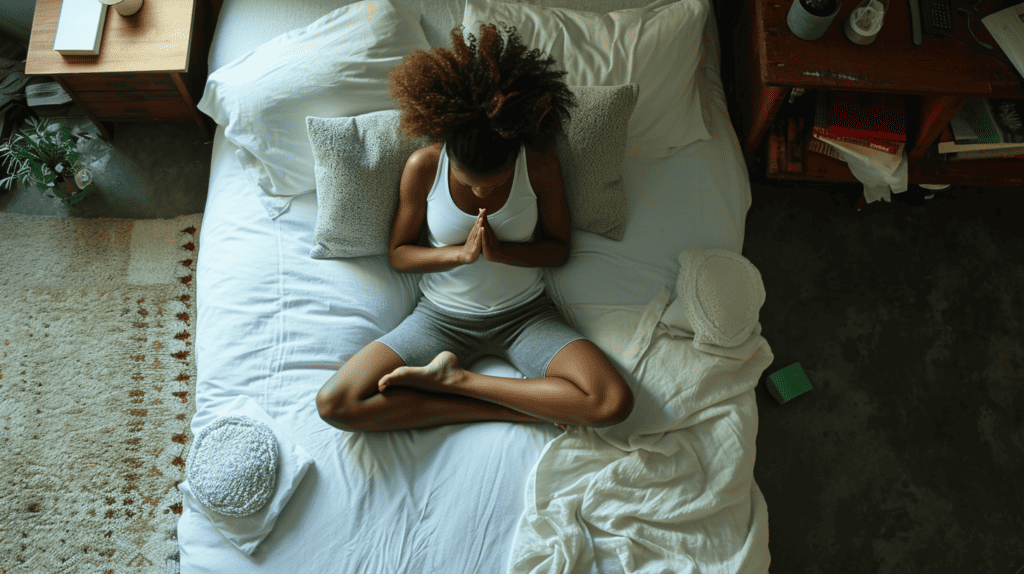Like many people, I have struggled with insomnia and poor sleep over the years. As both a meditation teacher and someone who battles their own sleep issues, I have found guided sleep meditation to be an incredibly helpful practice.
So what is guided meditation for sleep? Guided meditation for sleep is a practice involving relaxing the body and calming the mind before bed through mindfulness techniques led by an audio recording in order to ease the transition into sleep.
Key Takeaways
- Guided sleep meditation helps relax the body and mind before bed through techniques like deep breathing, visualization and progressive muscle relaxation.
- Studies show meditation improves ability to fall asleep faster and sleep more deeply.
- Ideal practice length ranges from 5 minutes to an hour based on individual sleep issues.
- Create a soothing pre-bed routine setting the stage for relaxation.
- Work with a teacher using calming scripts focused specifically on improving sleep.
- Meditation outperforms other standalone relaxation methods for sleep problems.
- Very safe to try for most people but check with your doctor for any health concerns.
- Struggling with disrupted or poor sleep? Commit to guided meditation for just 5-10 minutes a night for several weeks and monitor changes in sleep quality.
Before starting meditation for sleep improvement, it’s recommended to consult with a healthcare professional to ensure it aligns with your specific health needs.
Guided Meditation for Sleep
Here is a recap of the meditation video:
Getting a Good Nights Sleep
Over 30% of American adults struggle to fall asleep or stay asleep through the night. As someone prone to sleep disturbances myself, I know how much this can impact your physical health, mental health, and overall quality of life. I spent years trying different solutions, from medication to adjusting my sleep hygiene habits. But the one thing that has helped me most is starting a regular guided meditation for sleep practice.
Sleep meditation involves relaxing the body and mind through mindfulness techniques right before bedtime. The goal is to prepare your body and mind for sleep, easing the transition into deeper and more restorative sleep stages. Guided sleep meditations often use calming music, deep breathing exercises, progressive muscle relaxation, and visualization to achieve this relaxed state.
My journey to healing my own sleep disorder led me to become a certified meditation teacher, and it is my life’s work to help others struggling with sleep finally get the restful sleep their body and mind needs through this simple daily practice.
Tip: Start small – even 5 minutes of guided meditation before bed can make a difference in your ability to fall asleep faster and sleep more deeply.
Benefits of Guided Meditation for Sleep
Meditation has been scientifically studied and shown to improve sleep quality and duration for those dealing with insomnia. Some of the top benefits of a consistent guided sleep meditation practice include:
How it Helps with Falling Asleep
- Lowers stress & anxiety levels: By relaxing both the body and mind before bed, meditation helps reduce racing thoughts and release physical tension that can prevent sleep.
- Slows down mind chatter: Focusing on the breath, body sensations, or guided imagery quiets the constant mind chatter that keeps many awake.
- Prepares body for sleep: Guided relaxation sends signals to the body that it’s time to slowly start entering the stages of sleep. This makes it easier to fall asleep.
- Improves sleep quality: Higher quality, uninterrupted deep sleep stages are increased through regular meditation.
“My mind often races at bedtime, but just 10 minutes of guided meditation is like giving my brain permission to peacefully drift off.”
Techniques Used in Sleep Meditations
There are a variety of research-backed techniques used in guided sleep meditations to relax the mind and body:
Deep Breathing
Slow, controlled inhale and exhale while focusing on the sensations of breathing have proven sleep-inducing effects.
Progressive Muscle Relaxation
Tensing and relaxing each part of your body, often starting with the toes and working upwards.
Guided Imagery
Soothing verbal stories and mental visualization that occupy wandering thoughts.
Body Scans
Slowly scanning attention throughout the body noticing areas of tension and letting them go.
| Technique | Description |
|---|---|
| Deep Breathing | Focusing on full inhale & exhale |
| Progressive Muscle Relaxation | Tensing and relaxing each body part |
| Guided Imagery | Soothing stories & visualization |
| Body Scans | Releasing tension through awareness |
“I like to use a blend of muscle relaxation and calming visualization during my nightly routine. This combination delivers me into dreamland within minutes!”
Ideal Session Length & Time
Most sleep specialists recommend doing guided meditation in the hour leading up to your set bedtime. Practices can range from 5 minutes to an hour long depending on your needs and schedule.
Even starting with just a simple 5-10 minute meditation for sleep can dramatically improve your rest according to studies. This helps transition both the mind and body into a deep state of relaxation ideal for sleep. However, those with more severe insomnia can benefit from longer 20-60 minute sleep meditation sessions with more time to unwind.
Finding the ideal duration for your needs may take some experimentation. You can also try out different meditation lengths and techniques until you find the perfect fit for overcoming your specific sleep problems. Be patient with yourself, relaxation takes practice!
“I committed to a short 10-minute audio meditation every night for a month. By week 2, I noticed a significant difference in how quickly I could fall asleep!”
Preparing for a Sleep Meditation Session

To get the most out of your guided meditation practice for better sleep, here are some key tips for setting yourself up for success:
- Create space – Set up a quiet, comfortable spot where you won’t be disturbed during your practice. I love meditating in my cozy bed!
- Unplug – Shut off screens and devices that can distract you which is vital for quality sleep.
- Establish a routine – Practice at the same time each night to let your mind & body relax in anticipation.
- Try Essential oils – Lavender, chamomile, bergamot further enhance the relaxation response.
- Wear comfy clothes – Wear something loose and soft so your body is at ease. I love stretching out in fuzzy pajamas!
- Adjust lighting – Softer, dimmer light via a bedside lamp sets the mood for sleep.
- Use a journal – Jot feelings before & after to track the efficacy of your meditation helps.
- Drink herbal tea – Sip on a cup of soothing caffeine-free tea like cinnamon or turmeric.
- Stretch – Simple neck rolls, shoulder shrugs prepare muscles for rest.
Following this type of soothing pre-bed routine primes your physiology for sleep by reducing cognitive arousal and releasing muscle tension. It lets your body know it’s almost time to relax into deep restoring sleep. Think of it as a do-not-disturb sign for your brain!
“I spritz lavender mist on my pillow, change into PJs, and sip chamomile tea to set the stage for my favorite meditation sleep adventure!”
Guided Meditation Scripts
If you’re new to sleep meditation, guided audio tracks can provide critical direction to calm both the mind and body effectively. Below are snippets from some of my favorite sleep meditation scripts along with links to the full recordings:
Forest Visualization for Restful Sleep
Find a comfortable position lying down or sitting. Allow your body to relax and your breathing to slow. When you’re ready, allow your imagination to take you on a journey.
The Forest Path
Imagine you are walking on a forest path, surrounded by tall, majestic trees. The morning sunlight filters through the canopy, bathing the path in a soft green glow. You hear birds sweetly singing in the branches above. Feel a cool breeze gently brush against your skin. Breathe in the fresh, earthy scent of moss and cedar.As you walk slowly down the path, you come upon a small clearing with a bubbling stream. The sunlight sparkles on the water. You sit down on a large rock at the edge of the stream, feeling completely at peace.
The Cabin
Nestled amongst the trees you notice a tiny log cabin, with a warm light glowing in the window. You get up and walk to the front door, opening it to find a cozy room with a feather bed and a crackling fireplace. You lie down on the soft bed, gazing at the flames. Feel your body sinking into the mattress. Listen to the soothing crackle of the fire. With each breath you become more and more relaxed.
Emerging Renewed
When you feel ready, take one last deep breath and gently open your eyes, emerging from the forest feeling calm, centered, and ready for restful sleep.
There are also many excellent guided sleep meditation apps and Youtube videos available for free. Having a teacher gently guide you through evidence-based breathing, grounding, and visualization techniques is deeply soothing. Over time, regular guided meditation practice trains the nervous system how to relax and better manage stress for improved sleep quality.
“I have a few favorite sleep meditation tracks in a playlist that I turn to on rough nights when I need extra help turning my mind off.”
Comparing to Other Relaxation Techniques
While meditation is not the only path to address sleep disorders, studies show it can be more effective for sleep than muscle relaxation, mindfulness, and deep breathing alone when done consistently.
Meditation essentially combines all three – steadying awareness in the present moment, deep diaphragmatic breathing, and progressive physical relaxation of muscle groups throughout the body. These all work together synergistically to activate the body’s relaxation response for deeper, longer sleep.
Moreover, meditation is unique in its ability to also temper psychological stressors like depression, anxiety, worry, and racing thoughts that commonly disrupt sleep. The focused-attention and open-monitoring types of meditation helps quiet cognitive arousal better than passive relaxation alone.
If you struggle with a busy, restless mind at bedtime, sleep meditation is likely to provide superior outcomes over using standalone deep breathing or imagery techniques. However, combining meditation with yoga, journaling, or music can further enhance benefits.
“No other intervention has given me the all-encompassing mind-body relaxation boost that pre-bed meditation provides.”
Effectiveness for Different Sleep Disorders
An abundance of research in recent years shows guided meditation helps significantly improve sleep measures for:
- Insomnia
- Sleep maintenance issues
- Reduced sleep quality
- Poor daytime function from lost sleep
- Stress and anxiety-related sleep problems
Results remain consistent for both healthy adults with suboptimal sleep as well as those diagnosed with chronic clinical sleep issues. Some studies have even shown regular meditation can help reduce need for sleep medications.
While more research is still needed, current findings suggest guided practices may also help with:
- Restless leg syndrome (RLS)
- Nightmares or disturbing dreams
- Narcolepsy
- Sleep apnea
- Circadian rhythm disorders
If you are dealing with any disruptive sleep disorder, committing to a daily guided meditation practice is undoubtedly worth trying under your doctor’s care. It offers a side-effect free way of potentially easing symptoms and regaining healthful sleep patterns again.
“After struggling with insomnia for decades and trying literally everything – including Ambien – meditation has given me my life back and ability to sleep soundly.”
Risks and Considerations
Guided meditation is very safe for most healthy adults without underlying conditions. However, there are a few risks and considerations worth noting:
- Those with PTSD should confirm relaxation practices won’t exacerbate symptoms.
- Avoid listening to meditations while driving or operating heavy machinery.
- Stop immediately if worsened anxiety, derealization or panic occurs.
- Inform instructors of injuries, disorders or physical limitations beforehand.
- Don’t overexert by assuming challenging poses if new to practice.
- See a sleep specialist for chronic insomnia lasting over 3 months.
Checking with your healthcare provider is also wise if dealing with any major sleep problems before starting a meditation routine. For people taking psychiatric medications or with certain sensitivities, tailored modifications allow safe engagement in mindfulness practices. Outside of these specialized cases, meditation is widely safe to incorporate for better sleep.
“Make sure to consult your physician if you have any outstanding health issues before diving into a sleep focused meditation regime.”
Conclusion on Guided Sleep Meditation
If you’re one of millions of people struggling with short or disrupted sleep, I cannot recommend developing a guided meditation for sleep practice enough. As both a lifelong insomnia sufferer and meditation teacher, I’ve witnessed firsthand how 10-30 minutes of guided relaxation techniques right before bed can radically transform sleep quality for even the worst insomniacs.
By activating the body’s innate relaxation response, guided sleep meditations bring both mental hyperactivity and physical tension down to levels conducive for restorative sleep. The multitude of studies supporting meditation as an antidote for poor sleep gives credence for anyone struggling in this area to give it an honest try. Commit to the consistent practice for several weeks and then see if you notice positive changes in your ability to fall asleep, sleep duration, or daytime impairment.
You deserve to wake up each morning feeling energized from a great night’s sleep. Guided meditation serves as the doorway to get you there naturally by teaching your mind and body how to chill out, let go of stress, and bask in soothing states that pave the way for deeper and more reparative sleep.
The bottom line is meditation provides a simple but profoundly effective means towards improving sleep in as little as minutes a day. So why not embrace this drug-free solution to finally resolve your sleep challenges and lead a well-rested life? Your mind and body will thank you!
FAQ on what is guided meditation for sleep
Q: How can meditating regularly before bedtime help me improve sleep quality?
A: Meditating before bedtime can greatly improve your sleep quality. Practices like mindfulness meditation help relax your body and mind, preparing them for a deep sleep state. These simple meditation techniques also assist in managing stress, a common cause of sleep problems. Lastly, sleep meditations help create good sleep hygiene by establishing a calm pre-sleep routine.
Q: What benefits do I get from practicing sleep meditation?
A: There are several benefits of sleep meditation. The first and foremost is better sleep quality. Regular practice can help you fall asleep faster, stay asleep longer, and wake up less frequently during the night. It can improve your sleep habits, bring natural sleep, and decrease instances of insomnia. Other benefits include stress reduction, more emotional balance, improved physical health, and mindful awareness of self.
Q: Can practicing mindfulness meditation truly lead to better sleep?
A: Yes, studies have shown that mindfulness meditation can lead to better quality sleep. This type of meditation promotes relaxation, which helps in transition into sleep. It also trains the mind to focus on the present moment, which can reduce worry and anxiety that lead to insomnia.
Q: I struggle with insomnia. Can sleep meditation help?
A: Yes, sleep meditation can be a useful tool in the management of insomnia. Meditation techniques such as deep sleep meditation and body scan meditation can help relax the body and quiet the mind, making it easier to fall asleep. Reducing overall stress and anxiety can also improve sleep and insomnia.
Q: What exactly does a body scan meditation for better sleep entail?
A: A body scan meditation is a simple meditation wherein you pay attention to different parts of your body, from your toes to the crown of your head. The goal is to promote relaxation and sleep. It can help you become aware of where you may be holding stress in your body and release it, leading to a relaxed state conducive to sleep.
Q: Is deep sleep meditation the same as guided sleep meditation?
A: Deep sleep meditation is a type of guided sleep meditation that focuses on achieving a deep sleep state. It often uses visualization or sleep stories to help you relax and slip into a state of deep, restful sleep. It’s particularly useful for those struggling to get to sleep or maintain a good quality of sleep through the night.
Q: How can simple meditation techniques help me relax the body and mind for a better sleep?
A: Simple meditation techniques for better sleep may involve focusing your attention on your breathing, a particular word or phrase, or on different parts of your body. When practiced regularly, these techniques can help relax your body and slow your mind, both of which are essential for transitioning smoothly into sleep. Trying meditation for sleep could be an easy way to help improve your sleep hygiene.
Q: How can meditation help with the quality of sleep I get each night?
A: Meditation improves the quality of sleep by targeting the factors that contribute to poor sleep, such as stress, anxiety, or a racing mind. Meditation techniques like mindfulness meditation can help reduce these problems and lead to more restful sleep. Additionally, sleep meditations help create steady sleep habits and promote better sleep hygiene, which in turn ensures higher quality sleep.
Q: Is it hard to get started with sleep meditation?
A: It’s quite easy! Sleep meditation is a practice that is straightforward and typically involves relaxing the body, calming the mind, and focusing on your breath. To get started, you can try guided sleep meditations available online which provide step-by-step instructions. These typically involve listening to relaxing sleep stories or body scan techniques to help you relax and drift off to sleep. It’s also recommended to have a consistent sleep schedule and meditation practice for best results.
Q: What are the long-term benefits of practicing sleep meditation regularly?
A: The long-term benefits of practicing sleep meditation include better overall health, improved mental clarity, heightened emotional balance, and increased energy levels. Regular practice can also help with insomnia, reduce the risk of sleep disorders, lead to more refreshing sleep, and contribute to longevity. So, beyond offering a way to improve your sleep, meditation may contribute to a more peaceful and healthier lifestyle.





Leave a Reply